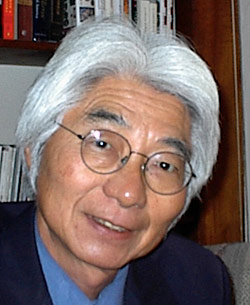In Memory of Professor Ronald Takaki : Asian-Nation : Asian American News, Issues, & Current Events Blog (original) (raw)
As many Asian American bloggers have been reporting around the internet and as the University of California, Berkeley has just confirmed, Professor Ronald Takaki has passed away at the age of 70:
Ronald Takaki, a professor emeritus of ethnic studies at the University of California, Berkeley, and prolific scholar of U.S. race relations who taught UC’s first black history course, died at his home in Berkeley on Tuesday (May 26). He was 70.
During his more than four decades at UC Berkeley, Takaki joined the Free Speech Movement, established the nation’s first ethnic studies Ph.D. program as well as Berkeley’s American Cultures requirement for graduation, and advised President Clinton in 1997 on his major speech on race.
A descendent of Japanese plantation workers in Hawaii, Takaki left the islands in the late 1950s to study at Ohio’s College of Wooster, where he earned a bachelor’s degree. He went on to earn a Ph.D. in American history from UC Berkeley in 1967 and was hired at UCLA, where he taught the campus’s first black history course. He joined Berkeley’s Ethnic Studies department in 1971 and served as chair from 1975-77.
Among his numerous accolades for scholarship and activism, Takaki received a Pulitzer nomination for his book, A Different Mirror: A History of Multicultural America (Little Brown and Company, 1993); a Distinguished Teaching Award from UC Berkeley and the 2003 Fred Cody Award for lifetime achievement from the Bay Area Book Reviewers Association.
As the Berkeley blurb above points out, Professor Takaki had a long and very distinguished career — he was an active member of the free speech movement in the 1960s, taught the University of California’s first Black History course, and was one of the early pioneers and leaders of UC Berkeley’s Ethnic Studies Department. In short, he was a giant in the field of Ethnic Studies.
He was also one of the early icons and most influential scholars of Asian American Studies as well and it was within this context that I first learned about him, read his work, and eventually met him in person.
In my junior year of college at UC Irvine, I had just begun my minor in Sociology and one of my first courses was “Race & Ethnicity” in which his book Iron Cages: Race and Culture in 19th-Century America was one of the assigned readings. Through his book and the course, I rediscovered my identity as an Asian American and as a person of color, after consciously and unconsciously trying to repress that identity ever since I was a young boy growing up in a predominantly White society.
Through his book and his other seminal book in Asian American Studies Strangers from a Different Shore: A History of Asian Americans, I finally saw that being a person of color and an Asian American was not a source of shame or embarrassment but rather, a source of pride, strength, and inspiration — a lesson upon which I have built this website, along with my entire life and professional career.
I finally had the opportunity to meet Professor Takaki in person in 1993, my final year of college, when he came to to UC Irvine to give a talk and promote the release of his book A Different Mirror. Before the lecture, he sat outside at a table signing books for people. I brought along my copy of Iron Cages for him to sign and as he wrote, “Celebrating our different shores” inside the front cover, he asked me my name, what I was studying (Political Science and Sociology), and my plans for the future now that I was graduating.
I told him that after studying Sociology and reading texts like his, I had decided to pursue my Ph.D. in Sociology. A big smile came to his face and he replied, “**That’s great, that means that one day we’ll be colleagues!**” It took a while, but about ten years later, I finally completed my Ph.D. and he and I finally did become colleagues.
A couple of years ago, Professor Takaki visited this area and gave a talk at Amherst College, sponsored by a colleague in the area (herself one of dozens, if not hundreds, of young scholars that Professor directly mentored through the years) and she invited me to have dinner with her and Professor Takaki before his talk. He didn’t remember me from that day in 1993, but when I told him the story and what he said to me, he again smiled and said, “I’m glad to see that it came true.”
Professor Takaki, thank you for your life of service to American society, to the fields of Ethnic Studies, Sociology, and Asian American Studies, and for inspiring this humble person to be proud to be an Asian American.

Update: The Los Angeles Times has an article that discusses Professor Takaki’s life and career in more detail and also reveals that as a result of his 20-year battle with multiple sclerosis, Professor Takaki took his own life. While some will focus on the way Professor Takaki died, I nonetheless prefer to focus on the way he lived.
Suggested reference: Le, C.N. . "In Memory of Professor Ronald Takaki" Asian-Nation: The Landscape of Asian America. https://www.asian-nation.org/headlines/2009/05/in-memory-of-professor-ronald-takaki/ ().

